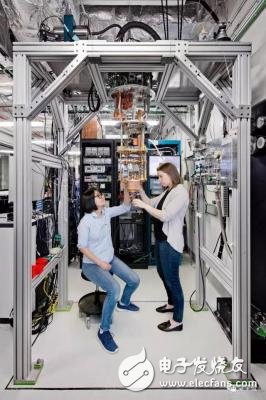Yesterday, the Chinese Academy of Sciences held a press conference to officially announce: "The world's first optical quantum computer that surpassed the early classic computer was born in China."
This matter is of course a good point, but it must also have the correct posture.
a few pointsSome people are excited to understand this as "the birth of the world's first quantum computer", which is obviously not right. I did not correctly understand the achievements of the professors of the National Science and Technology University, such as Pan Jianwei, Lu Chaoyang, Zhu Xiaobo, and Zhejiang University, and Wang Haohua.
What is the performance of this quantum computer in China? Visible through public information:
â– There is currently only one single-photon quantum simulator, and the feasibility of solving the linear equations by the parallelism of quantum computing is proved.
â– The simulator for this research is 10 to 100 times faster than the first human tube computer (born in 1946) and the first transistor computer (born in 1954).
In fact, the breakthroughs in this matter are reflected in the following three aspects:
1, high efficiency multiphoton Bose sampling
On the issue of Bose sampling, quantum algorithms have an exponential advantage. The Pan Jianwei team created a photon quantum computer that specializes in calculating Bose sampling. When calculating the three-photon, four-photon, and five-photon Bose sampling problems, the calculation speed is faster than that of foreign counterparts and early computers.

2. Implement 10-bit entanglement and parallel logic operation in superconducting circuit
As far as the situation has been disclosed, it is the largest number of bit entanglements in superconducting quantum systems, which is also at the leading level in the world.
3. Solving linear equations using a superconducting quantum processor
On the four superconducting qubits, the feasibility of solving the linear equations by the parallelism of quantum computation is proved.
Let me talk about it here. I understand it naturally. I don’t understand it. I have a simple summary of the qubit: a great result, but it still needs to be treated calmly.
Basic principles and status quoYesterday many readers left a message in the background, hoping to explain the quantum computer. Then, the next qubit will forcefully talk about quantum computers.
At present, quantum computers have many methods of implementation. The Pan Jianwei team used the superconducting + multiphoton method. In addition to this, there are semiconductor quantum chips and ion traps and the like.
In order to make quantum computers, Google and IBM have come up with a superconducting circuit that has been used in the semiconductor industry for decades. Intel wants to use traditional silicon transistors, and a company called ionQ uses ions.
The core principle is nothing more than a strange and counter-intuitive world of quantum mechanics (including superposition states and entanglement, tunneling) to speed up the calculation.
Unlike traditional computers that use 0 or 1 bits to store information, quantum computers use quantum bits to store information. The information stored by the qubit may be 0, may be 1, or may be both 0 and 1.
Quantum mechanics believes that microscopic objects can be in a "plausible" state, that is, an atom can be in two states at the same time.
One qubit can store information in two states, that is, 0 and 1; two qubits can store information in four states, three in eight, and four in six.
The performance of quantum computers increases exponentially with the increase of "qubits", while traditional computers grow linearly by "bits." There is always a tipping point, and the performance of quantum computers will outpace that of traditional computers.
Although quantum computers seem to be beautiful, there are still many challenges. The biggest problem is that the accuracy of these computers is much lower than that of traditional computers. Some minor disturbances can cause great damage.

Not long ago, in IBM's quantum computer competition with ionQ, the two computers developed were only 35% and 77% accurate.
This is only the case of five qubits. If there are tens of thousands of qubits, then the quantum computer may not be able to get the correct result.
And the five qubits of computers are far behind our laptops.
What is it like? Give a chestnut
Say a thousand and ten thousand, what about quantum computers? Let's take a real "chestnut": D-Wave. This Canadian company is a controversial star in the quantum computer world.
D-Wave developed the world's first commercial quantum computer. At the beginning of the year, they launched a fourth-generation product that can handle 2000 qubits: 2000Q, which sold for more than 100 million yuan.
Starting System,Starting Air System,Engine Starting System,Stop And Start Engine System
Chongqing LDJM Engine Parts Center , https://www.ckcummins.com
